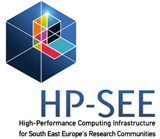 |
PRACE-1IP: Partnership for Advanced Computing in Europe AISBL - First Implementation Phase Project http://www.prace-ri.eu/PRACE-Second-Implementation-Phase European Commission, FP7, Research infrastructures project 2011-2013 |
The purpose of the PRACE RI is to provide a sustainable high-quality infrastructure for Europe that can meet the most demanding needs of European HPC user communities through the provision of user access to the most powerful HPC systems available worldwide at any given time. In tandem with access to Tier-0 systems, the PRACE-2IP project will foster the coordination between national HPC resources (Tier-1 systems) to best meet the needs of the European HPC user community. To ensure that European scientific and engineering communities have access to leading edge supercomputers in the future, the PRACE-2IP project evaluates novel architectures, technologies, systems, and software. Optimizing and scaling of application for Tier-0 and Tier-1 systems is a core service of PRACE.
PRACE-2IP is organised in twelve interrelated Work Packages that produce the project results in parallel. To structure the work they are grouped in four pillars: Tier-1 integration, Technology & Industry, Applications and Training and Dissemination. Actions directly visible to the users of PRACE include regular training events, scientific conferences and publishing a PRACE magazine focusing on the results from Tier-0 and Tier-1 projects. A special focus will be on the establishment of PRACE Advanced Training Centres (PATC) in Europe. In addition the deployment of additional Tier-0 systems and including Tier-1 systems in the European HPC ecosystem as well as a periodic call for proposals, petascaling of applications and creation of a petascaling guide will be covered by the project.
Activities and news related to the project:
 |
PRACE-1IP: Partnership for Advanced Computing in Europe AISBL - First Implementation Phase Project http://www.prace-ri.eu/PRACE-First-Implementation-Phase European Commission, FP7, Research infrastructures project 2010-2012 |
The PRACE RI is a pan-European infrastructure seated in Brussels and established as an international non-profit association of European government representative organizations responsible for High-Performance Computing resources and services for public research. Named ‘Partnership for Advanced Computing in Europe AISBL’, it currently has 24 members, representing Austria, Bulgaria, Cyprus, Czech Republic, Denmark, Finland, France, Germany, Greece, Hungary, Ireland, Israel, Italy, The Netherlands, Norway, Poland, Portugal, Serbia, Slovenia, Spain, Sweden, Switzerland, Turkey and the UK. These partners are creating a pan-European world class computing and data management infrastructure, providing access to resources at the highest performance level including sophisticated services for scientific simulations in all fields of science and engineering.
The PRACE RI is open to all European researchers and their collaborators for research with potential for high European and international impact. Applications for access are subject to peer review overseen by the PRACE Scientific Steering Committee comprised of leading European researchers.
The PRACE leadership systems form the apex of resources for large-scale computing and data management for scientific discovery and engineering research and development for the benefit of Europe and are well integrated into the European HPC ecosystem. PRACE is funded by member governments through their representative organizations and EU’s Seventh Framework Programme (FP7/2007-2013) under grant agreement n° RI-261557. The first PRACE computer systems and their operations are funded by the governments of the representative organizations hosting the systems.
The PRACE-1IP project expedites the implementation of the PRACE services to enable European researchers to exploit the unprecedented resources of PRACE and to produce breakthrough results through large-scale simulations of natural phenomena and technical systems and analysis of the large datasets gathered in many disciplines.. Experts from the PRACE-1IP project support users in porting, petascaling, and optimising their applications. An extensive education and training program familiarises current and future users with new methods, novel languages, and modern programming paradigms and a diversity of system architectures. The distributed systems will be managed consistently and integrated seamlessly into the European High-Performance Computing (HPC) ecosystem. The project will advise PRACE on next generation production systems. It explores advanced technologies through prototypes to stay abreast with hardware and software developments towards future exascale systems.
 |
Cosmic Harmony Ministry of Science of Serbia, Popularization of Science Grant 2009 |
|
Cosmic Harmony is a project that explores the boundary between the visual arts and physical sciences. The project celebrates 2009 as the International Year of Astronomy (IYA09), a joint initiative of UNESCO and the International Astronomical Union. Its principle components are two simultaneous exhibitions by the Paris based artist Milica Zivadinovic to be held in Belgrade, Serbia in September 2009. "Time of Tetraktys" and "Vision of the Universe" find inspiration in the breathtaking views of the Cosmos uncovered by modern science, as well as in the exploring of our relation, as sentient beings, to that wider reality. The art offers a visualization of the science and the process of discovery that is directly accessible to a wider audience. Cosmic Harmony is realized in coordination with the Scientific Computing Laboratory of the Institute of Physics in Belgrade. The project is funded by a popularization of science grant from the Ministry of Science and Technological Development of the Republic of Serbia. The organizers of the Cosmic Harmony project are indebted to the Society of Astronomers of Serbia the national node for IYA09, Gallery DOB (Dom Omladine Beograd) and the Atrium Gallery (Belgrade City Library).   |
||
 |
HP-SEE: High-Performance Computing Infrastructure for South East Europe’s Research Communities |
HP-SEE focuses on a number of strategic actions. First, it will link the existing and upcoming HPC facilities in the region in a common infrastructure, and provide operational solutions for it. As a complementary action, the project will establish and maintain the GÉANT link for Caucasus. Second, it will open this HPC infrastructure to a wide range of new user communities, including those of less-resourced countries, fostering collaboration and providing advanced capabilities to researchers, with an emphasis on strategic groups in computational physics, chemistry and life sciences. Finally, it will ensure establishment of national HPC initiatives, and act as a SEE bridge for PRACE. In this context, HP-SEE will aim to attract the local political & financial support for long-term sustainable eInfrastructure.
The HP-SEE initiative builds on the lasting cooperation in the SEE region, embodied in a number of eInfrastructure EC-funded initiatives, aiming at equal participation of less-resourced countries of the region in European trends. The SEEREN initiative established a regional network and the SEE-GRID initiative the regional Grid, while BSI project has established GÉANT link to Caucasus. The SEE-LIGHT project is working towards establishing a dark-fibre backbone that will interconnect most National Research and Education Networks in the Balkan region.
HP-SEE aspires to contribute to the stabilisation and development of South-East Europe, by overcoming fragmentation in Europe and stimulating eInfrastructure development and adoption by new virtual research communities, thus enabling collaborative high-quality research across a spectrum of scientific fields.
Activities and news related to the project:
 |
Simulation and analysis of complex networks in planetary dynamics Bilateral project, Serbia and Slovenia 2005-2007 |
